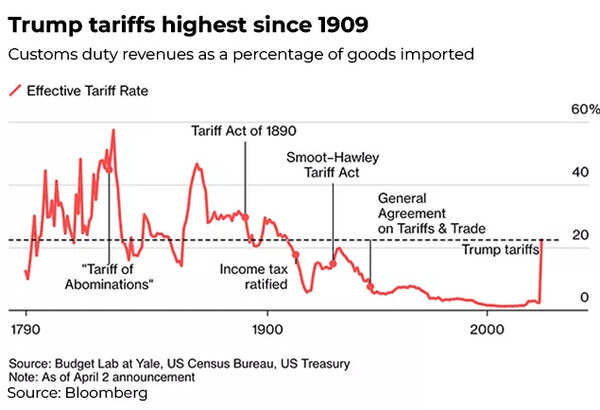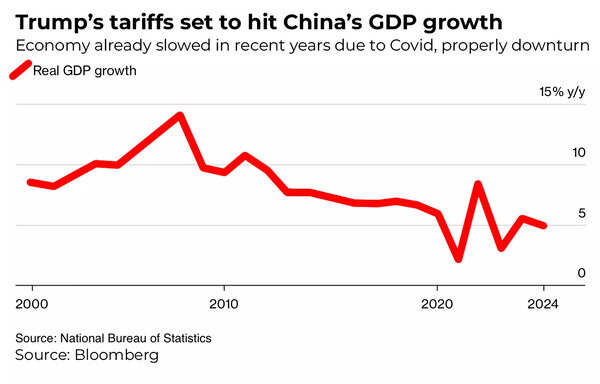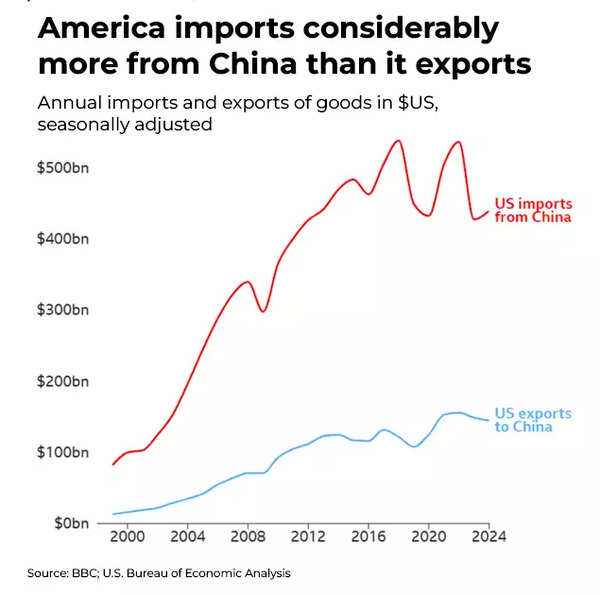US President Donald Trump’s sweeping “reciprocal” tariffs—most notably a stunning 104% levy on Chinese imports—came into force on Wednesday, starting a global trade war, shaking markets, triggering alarm from economists, and creating fissures within the Republican Party.
In response, China is raising its retaliatory tariff on US goods to 84%, up from 34%, effective April 10, the finance ministry said on Wednesday. “The tariff escalation against China by the United States simply piles mistakes on top of mistakes (and) severely infringes on China’s legitimate rights and interests,” the ministry said. The ministry emphasized its resolve, saying, “If the US insists on further escalating its economic and trade restrictions, China has the firm will and abundant means to take necessary countermeasures and fight to the end.”
So far, Chinese President Xi Jinping has not shown any interest in bargaining with Trump.

Why it matters
- Trump’s trade war isn’t just an economic experiment—it’s a full-blown political gamble that may unravel his presidency, the Republican hold on Congress, and the global trade system built after World War II.
- “Unless he suddenly changes direction, which is unlikely, Donald Trump is committing political suicide,” writes economist Swaminathan Aiyar in The Economic Times, calling it a “Riveting Political Suicide Show.” “Such an outcome is to be wished devoutly,” writes Aiyar. “It will mean the end not just of Trump, but of Trumpism.”
- The tariffs, billed by Trump as a righteous strike against “unfair” trade, are already causing deep economic reverberations, with Wall Street crashing, Treasury yields surging, and even Trump loyalists expressing discomfort.
- Senator Ted Cruz warned the fallout could be a “blood bath” for Republicans in the 2026 midterms, paving the way for Democratic control of both houses. That, he said, would cripple Trump’s presidency in its final two years and potentially spark a rebellion within the GOP itself.
- Former treasury secretary Larry Summers issued a starker warning: the tariffs are likely to induce a US recession, potentially costing 2 million jobs and $5,000 per family in lost household income.
- Trump tariffs may hit China’s GDP growth, which will impact global trade.

The big picture
Markets in meltdown: Hedge fund titan Bill Ackman called the tariff math “stupidity.” JPMorgan’s Jamie Dimon warned in his investor letter that a recession is now probable. BlackRock’s Larry Fink was even blunter: “The economy is weakening as we speak.”
China’s counteroffensive: Beijing accused Washington of “bullying practices” and vowed “firm and forceful” retaliation. It may ban key US imports—like poultry, soybeans, and Hollywood films—and cut cooperation on fentanyl and IP protection.
Allies alienated: Even countries with zero tariffs on US goods—like Israel—have been slapped with new duties. Others like Vietnam and Taiwan offered to reduce their tariffs to zero, only to be rebuffed.
Trump’s trade logic is simple but dangerous: Any bilateral trade deficit implies unfair trade. Economists call this “economic illiteracy.”

What they’re saying
- “I know what the hell I’m doing,” Trump told Republicans at a fundraising dinner. “Countries are calling me, kissing my ass… dying to make a deal.”
- “The world will just end up poorer,” writes Martin Wolf in the Financial Times, labeling Trump’s tariff metrics “utter lunacy.” He adds, “This is not trade policy. It’s an act of war against the entire world.”
- “There’s nothing complicated about this,” Summers said on Bloomberg TV. “Any ‘B’ student knows this is a supply shock that raises prices and raises unemployment.”
- On X, even some MAGA supporters were rattled: “That’s no way to talk about other countries. All his negotiating tactics could be turned against him, and the American people would end up paying for all his arrogance.”
Optimists hope political and business pressure on Trump will force him to reverse course. But he believes high tariffs will not cause inflation. He’s willing to take the short-term pain of a recession for long-term gain. He aims for not victory in the 2026 midterm elections, but a place in history as the president who destroyed the postWW2 order and created a new one that made the US a great manufacturing power again. Alas, he’s more likely to gain historical immortality as a megalomaniac populist who committed economic and political suicide.
Swaminathan S Anklesaria Aiyar
Between the lines
Trump believes tariffs will fund income tax cuts, restore US manufacturing, and create a new economic order with the US at the helm.
He’s openly idolized President William McKinley, who funded federal spending in the 1890s entirely through import duties. Trump’s team estimates $600 billion in tariff revenue—enough to slash or eliminate income taxes. But this assumes imports don’t collapse, which contradicts Trump’s goal of reducing them. A classic contradiction.
“He cannot both slash imports and gain massive tariff revenue,” notes Aiyar. “None in the Cabinet dares tell him that.”
Peter Coy at Foreign Policy calls this a “hall of unintended consequences.” Trump wants a weaker dollar for trade, but also a strong dollar to preserve US reserve currency dominance. Instead, investors are losing faith in both goals—and the dollar is falling, defying economic theory.
Zoom in
Trump’s trade formula—tariffs based on bilateral trade deficits—is mocked by economists worldwide.
“It assumes that in a fair world, every country should have a balanced trade account with every other,” writes Wolf. “That’s not policy. That’s lunacy.”
So long as Maga dominates the American right, the US potential for unpredictable, irrational and pernicious behaviour will remain. That is, alas, a huge gift to China. But the worse it now gets, the more likely it is that Maga will be an interlude, not America’s destiny. This is a consolation and a hope.
Martin Wolf: Trump’s tariffs will damage the world
Economist Maurice Obstfeld dismantled Trump’s strategy at a recent Brookings conference, stating, “There’s no scenario where the US can weaken the dollar, impose tariffs, and expect foreign cooperation—all at the same time.”
Meanwhile, the Mar-a-Lago Accord—a leaked blueprint for strong-arm trade diplomacy—suggests allies may be coerced into compliance using economic and military leverage. Trump’s advisor Stephen Miran reportedly told foreign partners: “Help us lower the dollar, or lose our protection.”
The world reacts
- Asian recalibration: Countries like Malaysia, Vietnam, and Singapore are already reassessing US ties. China has offered zero tariffs for least-developed countries and is championing the Regional Comprehensive Economic Partnership (RCEP) to reshape trade away from the US.
- EU’s subtle strike: Europe is expected to target US digital services, tax revenue instead of profits, and crack down on tech monopolies—a form of “trade war by other means.”
- Global slowdown: With both the US and China reversing economic gears, the world risks a stagflationary spiral—falling supply, deflation in China, and surging prices in America.
- “The two great locomotives of the global economy are now in reverse,” warns Aiyar.
What’s next?
Recession watch: Summers predicts deep economic pain. The S&P 500 is already down nearly 18% from its February peak, with more turbulence expected. Major banks are now re-evaluating corporate loan books, fearing defaults.
India’s dilemma: India is playing it safe, hoping to negotiate a symbolic deal that may only benefit the US.
China steps up: Beyond matching tariffs, Beijing may ban American firms from key sectors, probe IP practices, and blacklist Hollywood imports. Tesla, which does a fifth of its business in China, is particularly vulnerable.
Bottom line
This isn’t just about tariffs. It’s about Trump’s vision of America’s place in the world—and his desire to destroy the liberal international order his predecessors built.
He’s not seeking short-term electoral wins. He wants historical immortality as the man who “made America a great manufacturing power again.” But if trends continue, he may go down as the megalomaniac populist who wrecked the economy and lost it all.
“The worse it gets now,” writes Wolf, “the more likely it is that MAGA will be an interlude—not America’s destiny.”
(With inputs from agencies)













